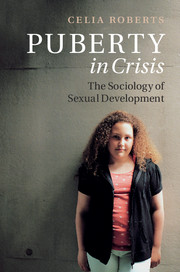Book contents
- Frontmatter
- Dedication
- Contents
- List of figures
- Acknowledgements
- 1 Puberty in crisis? Sex, reproduction and the loss of future
- 2 Articulating findings, feelings and figurations: methods and approaches
- 3 Telling histories: the scientific study of puberty
- 4 Defining early onset puberty: troubling findings about sexual development
- 5 Causes and explanations: genes, fat, toxins and families
- 6 Consequences of early development: sex, drugs and shortness
- 7 Treatments: pharmaceuticals, sex and suffering
- Conclusion: Folding puberty differently: changing findings, feeling and figurations
- References
- Index
5 - Causes and explanations: genes, fat, toxins and families
Published online by Cambridge University Press: 05 August 2015
- Frontmatter
- Dedication
- Contents
- List of figures
- Acknowledgements
- 1 Puberty in crisis? Sex, reproduction and the loss of future
- 2 Articulating findings, feelings and figurations: methods and approaches
- 3 Telling histories: the scientific study of puberty
- 4 Defining early onset puberty: troubling findings about sexual development
- 5 Causes and explanations: genes, fat, toxins and families
- 6 Consequences of early development: sex, drugs and shortness
- 7 Treatments: pharmaceuticals, sex and suffering
- Conclusion: Folding puberty differently: changing findings, feeling and figurations
- References
- Index
Summary
It is useless to proceed by trying to separate nature from nurture and looking at how they interact. The causal effects of nature and nurture on development are simply not separable.
(Keller 2010: 81)Scientists and clinicians across the world claim that more and more girls are entering into puberty early. Although epidemiological evidence remains contested, there is general agreement that these are notable secular trends. But what is causing these changes?
In her 2000 New York Times article, ‘The Making of an Eight-Year-Old Woman’. journalist Lisa Belkin reminds us of the social embedding of research questions, noting how cultural concerns shape scientific enquiry. In the quote below, Belkin reports an encounter in which scientist Marcia Herman-Giddens, lead author of the Pediatric Research in Office Settings (PROS) study described in Chapter 3, talks her through a set of powerpoint slides about early onset puberty:
[W]hat we know is limited by what we think to ask. Scientific hypotheses necessarily reflect a moment in time. The parade of possible triggers that Herman-Giddens clicks onto her wall is also a list of society's front-andcenter concerns. Obesity. Pollution. Food additives. Divorce. Soft porn. If we weren't worried about these things, we wouldn't think to investigate them. Puberty research, like so much scientific research, is a mirror onto our fears. (Belkin 2000)
Acknowledging and exploring these fears, this chapter analyses an astonishingly diverse range of explanations of contemporary changes in sexual development: from theories that emphasise the role of genes and obesity to arguments focusing on environmental toxins and familial and psychological patterns of relating. In this, I continue to theorise pubescent bodies as bio-psycho-social; as enacted through a plethora of experiences and discourses that emphasise ‘micro’ and ‘macro’ processes and relations at different times and in different places. Early developing pubertal bodies, I argue, demonstrate the intra-actions of biological actors such as hormones, genes, hair or fat with psychosocial encounters and discursive formulations and practices in the naming and living of any particular body in space and time.
- Type
- Chapter
- Information
- Puberty in CrisisThe Sociology of Early Sexual Development, pp. 128 - 166Publisher: Cambridge University PressPrint publication year: 2015



